Papers by Reginald Nii Odoi

Reginald Nii Odoi, 2019
The foundation of every marriage contract is the exchange of promises between a man and a woman. ... more The foundation of every marriage contract is the exchange of promises between a man and a woman. Such promise represents a manifestation of an intent to act in a way that allows another to believe that a serious commitment has been made and that such a person is assured of one’s committed behavior going forward. However, such serious promises are frequently being breached and thus the need to protect "victims". This article seeks to give an overview of the position of the law in Ghana on the consequences of a breach of a promise to marry and related matters.Indeed, men and women would continue to love one another and by so doing make promises to marry each other. As to whether these promises are intended to be serious and legally binding is something for the Courts to decide. It is however necessary for Ghanaians and citizens of the world to know that the consequences of their promises to marry each other may have far reaching consequences. This is just to warn you and keep you on notice. It is safer to make a serious promise and be committed to see it through. Beware, it is not just a mere promise!

SSRN Electronic Journal, 2022
Since Ghana gained independence, commercial activities and other related business and trading act... more Since Ghana gained independence, commercial activities and other related business and trading activities have greatly increased. As a result, it has become necessary to define the scope and boundary of the body of substantive jurisprudence that is applicable to the rights and relations of persons engaged in commerce and trade pursuits. It has become a difficult task to apply a universal definition to the term “commercial law.” The task of defining the boundaries of commercial law amongst other branches of human knowledge without trespassing on neighboring grounds that are interdependent on each other tends to be a difficult one. That notwithstanding, commercial law has attained a status of preeminence the world over and more specifically Ghana, due to factors including growth of entrepreneurial activity; the attitude of the legislature and the courts, amongst others. This paper seeks to give an introduction into the substantive jurisprudence of commercial law and also to attempt to define the scope and boundary of the subject as pertains to the Ghanaian context. In doing so, the paper traces the history and evolution of modern commercial law; highlights the characteristics and functions of the commercial law of Ghana; enumerates the sources of commercial law in Ghana; makes critical suggestions towards the codification of commercial law in Ghana and finally concludes with the challenges and future of the commercial law of Ghana.

SSRN Electronic Journal, 2021
The role of quasi-judicial bodies is without doubt of golden importance especially in our part of... more The role of quasi-judicial bodies is without doubt of golden importance especially in our part of the world considering our adversarial system and the reactive nature of the courts which makes the regular courts unable to ensure the full enforceability of human rights. In our part of the world, many victims of human rights violations due to illiteracy are unaware of their rights and thus are unable to exercise the enforcements and protection of their rights in the courts. Also, some victims due to financial constraints or the fear of unending litigation shy away from the courts. This and many more justify the establishment of the Commission on Human Rights and Administrative Justice (CHRAJ) as a human rights institution since it supplements the role of the court by increasing public awareness through education as well as conducting its functions in such a manner so as to promote the protection of the fundamental human rights provisions enshrined under the 1992 Constitution of Ghana. In recent times the Supreme Court of Ghana has, through decided cases, defined the scope of CHRAJ’s mandate thereby outlining the jurisprudence of its mandates. This paper would take the form of a combination of a Prescriptive and Descriptive study analyzing the scope of CHRAJ’s mandate under the 1992 Constitution as well as relevant laws whilst resorting to some decisions of the Supreme Court so as to ascertain the scope of CHRAJ’s mandate at present. Thereafter, recommendations would be proposed aimed at ensuring the effectiveness of CHRAJ in line with its aim of promoting and protecting the fundamental human rights of the citizenry especially by resorting to the functions of similar institutions in other jurisdictions. The study, thus, is very significant because CHRAJ has a critical role to play in promoting and protecting human rights and integrity. In light of Ghana’s political and legal history, it is expedient that CHRAJ maintains its widespread but properly controlled investigative role since it provides a low-cost access to the enforcement of human rights, bypassing the high cost of access to the judicial system. It thus has the potential of extending the reach of fundamental human rights to many ordinary people and protection for them from abuse of power, corruption and unfair treatment by public officials.

SSRN Electronic Journal, 2020
It is certain that human life is not perpetual and surely does come to an end. That notwithstandi... more It is certain that human life is not perpetual and surely does come to an end. That notwithstanding, during one’s lifetime, several properties whether movable and/or immovable are acquired but cannot be carried along into the afterlife. Thus, the Ghanaian law and the Common law in general allows persons to execute Wills as the legal means by which property acquired during their lifetime could be disposed of, in the event of death. Wills represent the aggregate of a person’s “testamentary intentions so far as they are manifested in writing and duly executed according to the statute.” Wills are capable of disposing of all real and/or personal property of the testator in accordance with law. The law also ensures that the true declaration of the last Will of a testator is that which is done after the death of the testator. The law follows the intentions of the testator by leaving everything to the unfettered discretion of the testator since the law presumes that the “instincts, affections and common sentiments” of the testator may be safely trusted to secure a better disposition of the property of the dead as compared to a distribution prescribed by the stereotyped and inflexible rules of a general law. However, there are instances where dependants of the deceased, whether deliberately or inadvertently, are not provided for in the Will of the deceased testator. In such instances, Ghanaian law does not leave dependants without a remedy. This Article thus seeks to explore the legal claim for reasonable provision out of the Will of a deceased testator in favor of dependants of the testator. By so doing, the Article would review the legal architecture as well as a number of decisions of the Superior Courts of Judicature on the subject so as to explore the jurisprudence on the subject of reasonable provision in a Will.

SSRN Electronic Journal, 2020
Execution is generally the process of enforcement of a judgment or order of a competent Court by ... more Execution is generally the process of enforcement of a judgment or order of a competent Court by a party in whose favor such judgment or order was made. As part of the process of Execution, an officer of the Court, in the case of Ghana the Registrar or Bailiff acting under the rules, takes possession of a property of a losing party to a legal action or suit, sells it and uses the proceeds in satisfaction of the judgment or order. In Ghana, shares in a body corporate are amenable to processes of execution. Shares constitute an interest of a shareholder in a company measured by a sum of money, for the purpose of liability in the first place, and secondly consisting of a series of mutual covenants entered into by all shareholders. This Article focuses on the execution of shares in Ghana by recounting the process involved. The paper goes further to consider as a matter of importance the legal effect of an execution of shares amidst a supposed restriction on the transfer-ability of share...

SSRN Electronic Journal, 2020
Ghana has over the years developed into a world player with its Government engaging in all kinds ... more Ghana has over the years developed into a world player with its Government engaging in all kinds of international business and economic transactions with foreign partners. All the same, Ghana being a sovereign nation does not act in a vacuum. All its actions must be done in line and in accordance with the laws of the country specifically the Constitution.<br><br>It is without doubt that Ghana’s Constitution reigns Supreme and is not superseded by any other law, act, etc be it domestic or international. Over the years, these international transactions entered into by the Government of Ghana and other international partners have ended up before the Courts of Ghana where the Courts in upholding the Supremacy of the Constitution have held that all these transactions being contracts involving the Government of Ghana are in a certain class which thus demands compliance with certain laid down requirements in the Constitution failure of which grave consequences have been suffered by these international partners.<br><br>It is thus necessary to consider the decisions in the light of Ghana’s Constitutional Supremacy, to sift out the road-maps as set out by the Courts of Ghana in order that Legal Advisers to foreign entities that contract with the Government of Ghana are aware of these important case laws in order to guide them appropriately on the Ghanaian law on this issue.

SSRN Electronic Journal, 2020
A human’s life is characterized by the acquisition of several properties which are material in na... more A human’s life is characterized by the acquisition of several properties which are material in nature and thus are left behind in the unlikely event of death. The death of a person who leaves property behind comes with its own issues. One of such is the need to ensure that the personal representatives of the deceased are clothed with the power to administer the estate of the deceased in favor of the named or intended beneficiaries. The grant of probate or letters of administration is very necessary in order for a personal representative to commence the distribution of the Estate. There are instances where a deceased person acquired properties in Ghana as well as in other countries of the world. As a result, it is common that named executors of that deceased person’s Will or in the case of one who died intestate, the administrators, would after applying for and being granted probate or letters of administration in the foreign country take steps to have the grant re-sealed in Ghana. This Article seeks to give the legal rules, practice and procedures governing the effect and enforceability, in Ghana, of the grant of probate or letters of administration made by foreign courts. This Article would employ a prescriptive and descriptive approach to assess the process in Ghana by which a grant of probate or letters of administration obtained outside Ghana is re-sealed in Ghana. Thereafter, the Article would make some recommendations that would ensure that certainty is brought to the process of re-sealing in Ghana and would make the process simpler and straightforward.
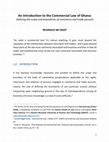
Reginald Nii Odoi, 2022
Since Ghana gained independence, commercial activities and other related business and trading act... more Since Ghana gained independence, commercial activities and other related business and trading activities have greatly increased. As a result, it has become necessary to define the scope and boundary of the body of substantive jurisprudence that is applicable to the rights and relations of persons engaged in commerce and trade pursuits. It has become a difficult task to apply a universal definition to the term “commercial law.” The task of defining the boundaries of commercial law amongst other branches of human knowledge without trespassing on neighboring grounds that are interdependent on each other tends to be a difficult one. That notwithstanding, commercial law has attained a status of preeminence the world over and more specifically Ghana, due to factors including growth of entrepreneurial activity; the attitude of the legislature and the courts, amongst others. This paper seeks to give an introduction into the substantive jurisprudence of commercial law and also to attempt to define the scope and boundary of the subject as pertains to the Ghanaian context. In doing so, the paper traces the history and evolution of modern commercial law; highlights the characteristics and functions of the commercial law of Ghana; enumerates the sources of commercial law in Ghana; makes critical suggestions towards the codification of commercial law in Ghana and finally concludes with the challenges and future of the commercial law of Ghana.
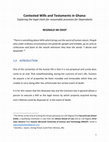
Reginald Nii Odoi, 2020
It is certain that human life is not perpetual and surely does come to an end. That notwithstandi... more It is certain that human life is not perpetual and surely does come to an end. That notwithstanding, during one’s lifetime, several properties whether movable and/or immovable are acquired but cannot be carried along into the afterlife. Thus, the Ghanaian law and the Common law in general allows persons to execute Wills as the legal means by which property acquired during their lifetime could be disposed of, in the event of death.
Wills represent the aggregate of a person’s “testamentary intentions so far as they are manifested in writing and duly executed according to the statute.” Wills are capable of disposing of all real and/or personal property of the testator in accordance with law. The law also ensures that the true declaration of the last Will of a testator is that which is done after the death of the testator.
The law follows the intentions of the testator by leaving everything to the unfettered discretion of the testator since the law presumes that the “instincts, affections and common sentiments” of the testator may be safely trusted to secure a better disposition of the property of the dead as compared to a distribution prescribed by the stereotyped and inflexible rules of a general law.
However, there are instances where dependants of the deceased, whether deliberately or inadvertently, are not provided for in the Will of the deceased testator. In such instances, Ghanaian law does not leave dependants without a remedy. This Article thus seeks to explore the legal claim for reasonable provision out of the Will of a deceased testator in favor of dependants of the testator. By so doing, the Article would review the legal architecture as well as a number of decisions of the Superior Courts of Judicature on the subject so as to explore the jurisprudence on the subject of reasonable provision in a Will.
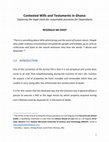
Reginald Nii Odoi, 2020
It is certain that human life is not perpetual and surely does come to an end. That notwithstandi... more It is certain that human life is not perpetual and surely does come to an end. That notwithstanding, during one’s lifetime, several properties whether movable and/or immovable are acquired but cannot be carried along into the afterlife. Thus, the Ghanaian law and the Common law in general allows persons to execute Wills as the legal means by which property acquired during their lifetime could be disposed of, in the event of death.
Wills represent the aggregate of a person’s “testamentary intentions so far as they are manifested in writing and duly executed according to the statute.” Wills are capable of disposing of all real and/or personal property of the testator in accordance with law. The law also ensures that the true declaration of the last Will of a testator is that which is done after the death of the testator.
The law follows the intentions of the testator by leaving everything to the unfettered discretion of the testator since the law presumes that the “instincts, affections and common sentiments” of the testator may be safely trusted to secure a better disposition of the property of the dead as compared to a distribution prescribed by the stereotyped and inflexible rules of a general law.
However, there are instances where dependants of the deceased, whether deliberately or inadvertently, are not provided for in the Will of the deceased testator. In such instances, Ghanaian law does not leave dependants without a remedy. This Article thus seeks to explore the legal claim for reasonable provision out of the Will of a deceased testator in favor of dependants of the testator. By so doing, the Article would review the legal architecture as well as a number of decisions of the Superior Courts of Judicature on the subject so as to explore the jurisprudence on the subject of reasonable provision in a Will.
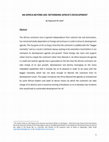
Reginald Nii Odoi, 2019
The African continent since it gained independence from colonial rule and domination, has remaine... more The African continent since it gained independence from colonial rule and domination, has remained totally dependent on foreign aid and loans in order to drive its development agenda. This has gone on for so long a time that the continent is saddled with the "beggar mentality" and as a result is laid back always waiting to be extended a hand before it can champion its development agenda and growth. These foreign aid, loans and support rather tend to cripple the continent rather than liberate it. An Africa beyond aid agenda is a bold and realistic agenda that is grounded on the fact that the African continent can take charge of its own growth, development and destiny leveraging on the many imbedded capabilities that it already has at its disposal in order to do away with the beggar mentality which has not done enough to liberate the continent from its development issues. This paper introduces the Africa Beyond Aid agenda as championed by some African leaders and seeks to devise means by which the continent can take charge of its destiny and reexamine existing orthodoxies so as to develop new mindsets that would lead to sustainable development for all.
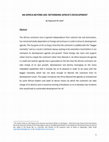
Reginald Nii Odoi, 2019
The African continent since it gained independence from colonial rule and domination, has remaine... more The African continent since it gained independence from colonial rule and domination, has remained totally dependent on foreign aid and loans in order to drive its development agenda. This has gone on for so long a time that the continent is saddled with the "beggar mentality" and as a result is laid back always waiting to be extended a hand before it can champion its development agenda and growth. These foreign aid, loans and support rather tend to cripple the continent rather than liberate it. An Africa beyond aid agenda is a bold and realistic agenda that is grounded on the fact that the African continent can take charge of its own growth, development and destiny leveraging on the many imbedded capabilities that it already has at its disposal in order to do away with the beggar mentality which has not done enough to liberate the continent from its development issues. This paper introduces the Africa Beyond Aid agenda as championed by some African leaders and seeks to devise means by which the continent can take charge of its destiny and reexamine existing orthodoxies so as to develop new mindsets that would lead to sustainable development for all.
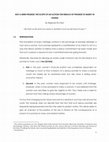
Reginald Nii Odoi, 2019
The foundation of every marriage contract is the exchange of promises between a man and a woman. ... more The foundation of every marriage contract is the exchange of promises between a man and a woman. Such promise represents a manifestation of an intent to act in a way that allows another to believe that a serious commitment has been made and that such a person is assured of one’s committed behavior going forward. However, such serious promises are frequently being breached and thus the need to protect "victims". This article seeks to give an overview of the position of the law in Ghana on the consequences of a breach of a promise to marry and related matters.Indeed, men and women would continue to love one another and by so doing make promises to marry each other. As to whether these promises are intended to be serious and legally binding is something for the Courts to decide. It is however necessary for Ghanaians and citizens of the world to know that the consequences of their promises to marry each other may have far reaching consequences. This is just to warn you and keep you on notice. It is safer to make a serious promise and be committed to see it through. Beware, it is not just a mere promise!
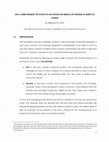
Reginald Nii Odoi, 2019
The foundation of every marriage contract is the exchange of promises between a man and a woman. ... more The foundation of every marriage contract is the exchange of promises between a man and a woman. Such promise represents a manifestation of an intent to act in a way that allows another to believe that a serious commitment has been made and that such a person is assured of one’s committed behavior going forward. However, such serious promises are frequently being breached and thus the need to protect "victims". This article seeks to give an overview of the position of the law in Ghana on the consequences of a breach of a promise to marry and related matters.Indeed, men and women would continue to love one another and by so doing make promises to marry each other. As to whether these promises are intended to be serious and legally binding is something for the Courts to decide. It is however necessary for Ghanaians and citizens of the world to know that the consequences of their promises to marry each other may have far reaching consequences. This is just to warn you and keep you on notice. It is safer to make a serious promise and be committed to see it through. Beware, it is not just a mere promise!
Reginald Nii Odoi, 2018
This paper takes the form of a combination of a Prescriptive and Descriptive study analyzing the ... more This paper takes the form of a combination of a Prescriptive and Descriptive study analyzing the scope of the Commission of Human Right and Administrative Justice's (CHRAJ) mandate under the 1992 Constitution of Ghana as well as relevant laws whilst resorting to some decisions of the Supreme Court of Ghana so as to ascertain the scope of CHRAJ’s mandate at present. Thereafter, recommendations are made with the objective of ensuring the effectiveness of CHRAJ in line with its aim of promoting and protecting the fundamental human rights of the citizenry especially by resorting to the functions of similar institutions in other jurisdictions.
In Ghana’s quest to develop an all-inclusive society built on the principles of equality, justice... more In Ghana’s quest to develop an all-inclusive society built on the principles of equality, justice and the rule of law, it is important that steps are taken to come into terms with issues surrounding Persons with Disability and thus mobilize support for the dignity, rights and well-being of such persons and in the process create awareness of well-meaning persons of society to aspire for the integration of all and sundry for national development.
This article would consider the adequacy of the legal framework in Ghana put in place to strengthen the protection of disability rights with a view to achieving the sustainable development goals and would go further to make recommendations for achieving these goals in the near future.
This article seeks to give the legal rules and procedures governing the effect and enforceability... more This article seeks to give the legal rules and procedures governing the effect and enforceability in Ghana of the grant of probate or letters of administration made by foreign courts.
This article seeks to give the legal rules and procedures governing the effect and enforceability... more This article seeks to give the legal rules and procedures governing the effect and enforceability in Ghana of the grant of probate or letters of administration made by foreign courts.
This paper focuses on the execution of shares in Ghana by recounting the process involved. The pa... more This paper focuses on the execution of shares in Ghana by recounting the process involved. The paper goes further to consider as a matter of importance the legal effect of an execution of shares amidst a supposed restriction on the transferability of shares contained in the regulations of a Company as made allowable by the Companies Code. This paper applies an analytical and descriptive approach in order to sift out the roadmap for execution of shares in a lawful manner as contained in the laws of Ghana as well as considering the legal effect of same with the view to making recommendations where necessary.
Uploads
Papers by Reginald Nii Odoi
Wills represent the aggregate of a person’s “testamentary intentions so far as they are manifested in writing and duly executed according to the statute.” Wills are capable of disposing of all real and/or personal property of the testator in accordance with law. The law also ensures that the true declaration of the last Will of a testator is that which is done after the death of the testator.
The law follows the intentions of the testator by leaving everything to the unfettered discretion of the testator since the law presumes that the “instincts, affections and common sentiments” of the testator may be safely trusted to secure a better disposition of the property of the dead as compared to a distribution prescribed by the stereotyped and inflexible rules of a general law.
However, there are instances where dependants of the deceased, whether deliberately or inadvertently, are not provided for in the Will of the deceased testator. In such instances, Ghanaian law does not leave dependants without a remedy. This Article thus seeks to explore the legal claim for reasonable provision out of the Will of a deceased testator in favor of dependants of the testator. By so doing, the Article would review the legal architecture as well as a number of decisions of the Superior Courts of Judicature on the subject so as to explore the jurisprudence on the subject of reasonable provision in a Will.
Wills represent the aggregate of a person’s “testamentary intentions so far as they are manifested in writing and duly executed according to the statute.” Wills are capable of disposing of all real and/or personal property of the testator in accordance with law. The law also ensures that the true declaration of the last Will of a testator is that which is done after the death of the testator.
The law follows the intentions of the testator by leaving everything to the unfettered discretion of the testator since the law presumes that the “instincts, affections and common sentiments” of the testator may be safely trusted to secure a better disposition of the property of the dead as compared to a distribution prescribed by the stereotyped and inflexible rules of a general law.
However, there are instances where dependants of the deceased, whether deliberately or inadvertently, are not provided for in the Will of the deceased testator. In such instances, Ghanaian law does not leave dependants without a remedy. This Article thus seeks to explore the legal claim for reasonable provision out of the Will of a deceased testator in favor of dependants of the testator. By so doing, the Article would review the legal architecture as well as a number of decisions of the Superior Courts of Judicature on the subject so as to explore the jurisprudence on the subject of reasonable provision in a Will.
This article would consider the adequacy of the legal framework in Ghana put in place to strengthen the protection of disability rights with a view to achieving the sustainable development goals and would go further to make recommendations for achieving these goals in the near future.
Wills represent the aggregate of a person’s “testamentary intentions so far as they are manifested in writing and duly executed according to the statute.” Wills are capable of disposing of all real and/or personal property of the testator in accordance with law. The law also ensures that the true declaration of the last Will of a testator is that which is done after the death of the testator.
The law follows the intentions of the testator by leaving everything to the unfettered discretion of the testator since the law presumes that the “instincts, affections and common sentiments” of the testator may be safely trusted to secure a better disposition of the property of the dead as compared to a distribution prescribed by the stereotyped and inflexible rules of a general law.
However, there are instances where dependants of the deceased, whether deliberately or inadvertently, are not provided for in the Will of the deceased testator. In such instances, Ghanaian law does not leave dependants without a remedy. This Article thus seeks to explore the legal claim for reasonable provision out of the Will of a deceased testator in favor of dependants of the testator. By so doing, the Article would review the legal architecture as well as a number of decisions of the Superior Courts of Judicature on the subject so as to explore the jurisprudence on the subject of reasonable provision in a Will.
Wills represent the aggregate of a person’s “testamentary intentions so far as they are manifested in writing and duly executed according to the statute.” Wills are capable of disposing of all real and/or personal property of the testator in accordance with law. The law also ensures that the true declaration of the last Will of a testator is that which is done after the death of the testator.
The law follows the intentions of the testator by leaving everything to the unfettered discretion of the testator since the law presumes that the “instincts, affections and common sentiments” of the testator may be safely trusted to secure a better disposition of the property of the dead as compared to a distribution prescribed by the stereotyped and inflexible rules of a general law.
However, there are instances where dependants of the deceased, whether deliberately or inadvertently, are not provided for in the Will of the deceased testator. In such instances, Ghanaian law does not leave dependants without a remedy. This Article thus seeks to explore the legal claim for reasonable provision out of the Will of a deceased testator in favor of dependants of the testator. By so doing, the Article would review the legal architecture as well as a number of decisions of the Superior Courts of Judicature on the subject so as to explore the jurisprudence on the subject of reasonable provision in a Will.
This article would consider the adequacy of the legal framework in Ghana put in place to strengthen the protection of disability rights with a view to achieving the sustainable development goals and would go further to make recommendations for achieving these goals in the near future.